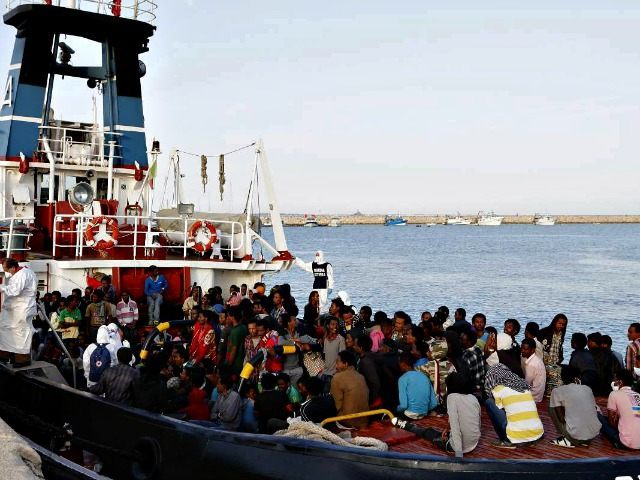European Union officials are reporting that more than 5,000 illegal migrants have been rescued en route to Italy in the Mediterranean Sea between Friday and Monday, one of the largest weekend tallies for officials since the newly reinvigorated Triton rescue program began its search operations in response to the growing demand for such travel from Africa to Europe.
Reuters reports that the 5,000 migrants were those in “boats in distress” that search and rescue teams found on the high seas, and that the rescue of 500 more is still “in progress.” At least one ship holding 454 migrants also contained the bodies of 17 who failed to make it to Europe alive. At least 25 ships found had traveled out of Libya, where two rival governments vying for power and an increasingly powerful Islamic State presence have made it near impossible to enforce migration laws against smugglers.
Reuters estimates the total number of migrants who have made it ashore to Europe so far in 2015 to have surpassed 40,000 with this new influx over the weekend.
The surge in migrants has triggered a new quota program organized by the European Union, which is receiving severe pushback from the nations being made to accept the largest numbers of migrants, including France and Germany. The nations released a statement this week objecting to the forced quotas on them, calling them “unbalanced” among the EU nations. The quotas are meant to ease the burden on Italy and Greece, which are both receiving the highest influx of migrants from the Mediterranean and Aegean Seas. Specifically, the nations objected that the proposal did not take into consideration other migrant populations that Germany and France have taken in, including high numbers of refugees from the Syrian Civil War. France and Germany were responsible for 40% of migrants entering Europe this year, according to the proposed quota numbers.
It is not yet known how the EU will square disagreements based on those numbers. What the individual countries can do to discourage the migration is also unknown, though Italy took a proactive step last week in dissuading smugglers. In an unprecedented decision, an Italian court sentenced the smuggler responsible for the deaths of hundreds of migrants aboard an Italy-bound Libyan ship to life in prison in Sicily. The May 2014 incident was among the first in the current migrant wave, and Italian officials hope the sentence will indicate to smugglers that they are not beyond the realm of European law when entering European waters.
Meanwhile, Greece struggles to prevent their own migrant crisis — consisting of Syrian refugees fleeing Turkey to enter the European Union, rather than Africans making their way out of Libya — from hindering their already weak economy. Hit hardest of all Greek regions is the island of Kos, which has become the most coveted landing spot for migrants. An estimated 1,200 migrants arrived in Kos this weekend alone, prompting an emergency meeting in Athens regarding how to handle the growing makeshift refugee camp on the island, described by the Daily Mail as “families sleeping on flattened cardboard boxes in rubbish-strewn streets” waiting to be processed by the Greek government.
The migrant crisis has caused alarm among Kos’s business owners, who have been preparing for an influx of summer tourism that may now not arrive, as publicity surrounding the migrants keeps tourists away. The Telegraph reports today that at least one UK travel website has reported a 52% drop in searches related to Kos following growing concern over the migrants, particularly reports from travel publications claiming the migrants are “spoiling the atmosphere” on the holiday island.

COMMENTS
Please let us know if you're having issues with commenting.